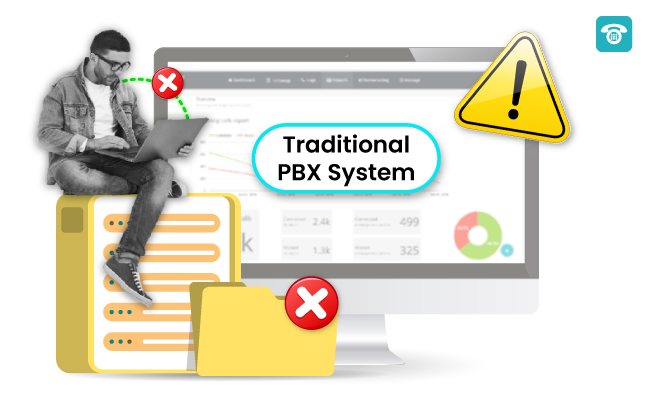We talk a lot about virtual PBX systems like MyOperator: A virtual telephone system within an enterprise which allows all users to share a number.
But before it went ‘virtual’, the traditional on-site PBX had already established its indispensability despite the various headaches it presented.
If you have ever used/are still using a traditional system, you can co-relate with this article pretty well.
In addition, the crux of the PBX technology is that it is connected to the enterprise’s fax and other tools of communications. So both voice and data calls can be routed to this exchange. This was a huge development, considering that before the PBX was introduced, whenever a member of the enterprise had to make a call, they had to go through a phone operator.
So before it went virtual on cloud technology, PBX had certain shortcomings such as costs, mobility, etc, which we will be talking about in this article.
Power outages
Firstly it is essential to know that there are two types of PBX systems. One being hardware PBX, phone systems equipped with the necessary software. The other being software PBX which routes calls out of the organisation over a platform such as Windows 2000.
In 90 cases out of a hundred, a hardware PBX is prefered. This is because, in case of power shortage or power cuts, the phone systems in the enterprise will not be knocked out with a hardware PBX. This is, of course, where there is a decent power back up system.
Even with it, the software PBX, which basically runs on your PCs (Personal Computers) will leave you without a phone system, if the server shuts down, depending on how the solution is configured.
This means, with a proper UPS backup, your virtual PBX still runs on your computer, while your hardware PBX is lost when the electricity is lost. Furthermore, your virtual PBX, being on a cloud network, can be accessed by your service provider or partners location, where there is electricity.
PBX Fraud
Corruption exists in all fields today. The PBX was no more immune to hackers than many other technical systems.
PBX fraud was most notorious in Europe, and hasn’t touched India so much. In 2003, a number of cases were registered, in the UK, which describes third-party companies, running calling card business elsewhere, abusing the lines of organisations. The organisations only realise that a theft has occurred when they receive their bill and see that it is far more than their regular charge.
These fraudsters have their modus operandi at nights and weekends when most business organisations would be closed. The hackers would then use such an organization’s PBX to rack up thousands of euros worth of calls.
A strong reaction against PBX is larceny is the ‘PBXwall’ technology, which is most profoundly being developed in Dublin and spreading to other parts of the world. A secure service provider, who uses authorization keys to allow access to the hosted PBX account might also help.
Just like there is antivirus software for the PC, ‘PBXwall’ protects the Virtual PBX from malicious interruptions.
[Tweet “#PBX fraud was most notorious in #Europe”]
Installation and Upgradation Expense
When talking about the SMEs, particularly in India, the cost factor is the rolling die. Hardware PBX, while advantageous in case of power breaks, because of their phone systems, are, for the same reason, pretty expensive to install.
This is, especially a concern when an upgradation is required, which wouldn’t affect the gross expense of the organisation much if the PBX service is done through an economical provider. Here the virtual PBX comes to aid, and with easy pay packages, it is cost-effective.
Call expense
SMEs look for a substantial cost reduction while choosing PBX technology. This is important because, while most of their calls might be local, some might be international and the cost variance might be quite disturbing. Hosted PBX (or virtual PBX), which allows calls through the net addresses this concern.
Mobility
A lot of organisations today, particularly in the small and medium sector, are generally mobile and travelling is a part of their operations. Hardware PBX may make it hard to shift phone systems from one place to another, which is again a glitch that Virtual PBX solves.
In addition, the bandwidth or the frequencies used for transmitting signals of the Local Area Network is wide, and there needs to be enough room to accommodate it.
Since a Virtual PBX has all its data in an account online, and relocation doesn’t pose a problem.
Other Concerns
An IP address is a unique string of numbers separated by full stops that identify each computer using the Internet Protocol to communicate over a network. The router and the switch networks need to have enough IP address.
Though the PBX has less sound quality degradation compared to a traditional phone line, a router which enables voice compression ( similar to compressing clothes in a suitcase for them to fit in) is essential, so as to enable the transfer of longer calls.
When choosing a PBX, ‘computerweekly.com’ suggests that businesses consider the following points:
-
The number of phones in the organisation and usage
-
How many sites need to be connected and the amount of traffic between them
-
The location of the main system and its interconnections to other systems
-
Which dial plans and level of resilience best suit your requirements
-
When the peak periods are for network traffic.
So invest your money wisely!
This article is contributed by Ankitha Ramki. She is currently a student of Psychology, writes online content for magazines and has worked as a reporter-journalist for the print media.



